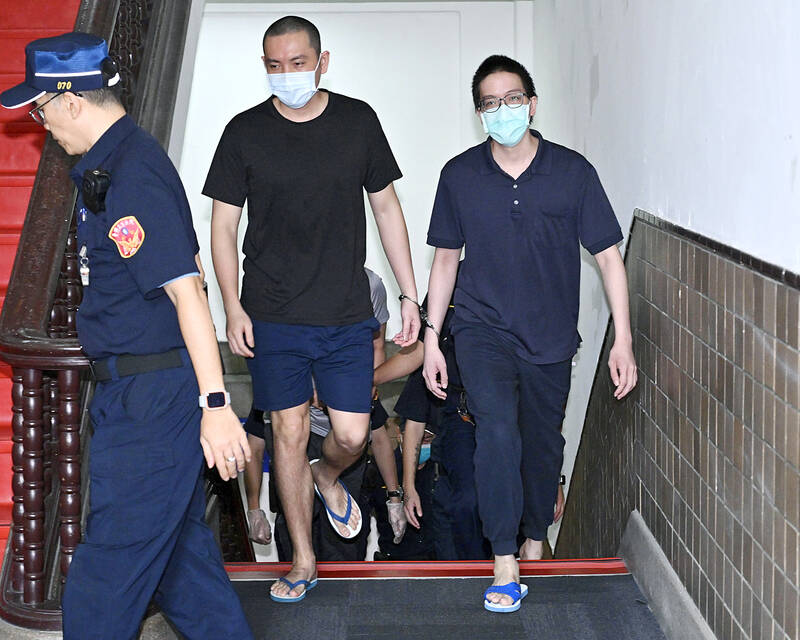The Supreme Court yesterday upheld the conviction of eight people for developing a spy network for China, and rejected appeals against the verdict. The High Court in August last year found them guilty of carrying out espionage activities in exchange for a monetary reward.
Three officers from the 601st Brigade of Aviation and Special Forces Command, Lieutenant Colonel Hsieh Meng-shu (謝孟書), and junior officers Ho Hsin-ju (何信儒) and Kang Yi-pin (康奕彬), were handed prison sentences of nine years, seven years and four months, and seven years and two months respectively.
Hsieh and several others, including 601st Brigade junior officer Lu Chun-fang (陸駿方), had filmed videos saying that they would surrender to the Chinese People’s Liberation Army if there is a war, in exchange for money, the court said.

Photo: Tu Chien-jung, Taipei Times
Hsieh was promised US$1.5 million in cryptocurrency to fly a CH-47 Chinook helicopter to China’s Shandong (山東) aircraft carrier, the court filing said.
People with knowledge of the plot tipped off the Military Intelligence Bureau and the Political Warfare Bureau, which led to the arrest of Hsieh and his coconspirators, it added.
The case could be traced back to two Taiwanese businesspeople working in China, Hsieh Ping-cheng (謝秉成) and Chen Yu-hsin (陳裕炘), who are both retired army personnel. They agreed to develop a Chinese spy network in Taiwan to obtain classified military information, and to recruit friends and colleagues in active service, in exchange for financial rewards.
Beginning in 2021, Chen and Hsieh recruited several officers, such as army major Hsiao Yi-yun (蕭翔云), and members of the 601st Brigade and other units, including the trio, Hung Jui-yang (洪睿洋), Liu Li-chi (劉立齊) and army officer Wu Chih-peng (吳志鵬).
Wu was later acquitted of all charges.
In yesterday’s verdict, Hsiao received a 13-year prison sentence, Hung got nine years, Lu received a term of five years and six months, Liu received an 18-month sentence, while Hsieh Ping-cheng was handed eight years.
Chen failed to turn up in court. Reports indicate he had fled to China, so an arrest bulletin has been issued for him.

Taiwanese were praised for their composure after a video filmed by Taiwanese tourists capturing the moment a magnitude 7.5 earthquake struck Japan’s Aomori Prefecture went viral on social media. The video shows a hotel room shaking violently amid Monday’s quake, with objects falling to the ground. Two Taiwanese began filming with their mobile phones, while two others held the sides of a TV to prevent it from falling. When the shaking stopped, the pair calmly took down the TV and laid it flat on a tatami mat, the video shows. The video also captured the group talking about the safety of their companions bathing

US climber Alex Honnold is to attempt to scale Taipei 101 without a rope and harness in a live Netflix special on Jan. 24, the streaming platform announced on Wednesday. Accounting for the time difference, the two-hour broadcast of Honnold’s climb, called Skyscraper Live, is to air on Jan. 23 in the US, Netflix said in a statement. Honnold, 40, was the first person ever to free solo climb the 900m El Capitan rock formation in Yosemite National Park — a feat that was recorded and later made into the 2018 documentary film Free Solo. Netflix previewed Skyscraper Live in October, after videos

Starting on Jan. 1, YouBike riders must have insurance to use the service, and a six-month trial of NT$5 coupons under certain conditions would be implemented to balance bike shortages, a joint statement from transportation departments across Taipei, New Taipei City and Taoyuan announced yesterday. The rental bike system operator said that coupons would be offered to riders to rent bikes from full stations, for riders who take out an electric-assisted bike from a full station, and for riders who return a bike to an empty station. All riders with YouBike accounts are automatically eligible for the program, and each membership account

A classified Pentagon-produced, multiyear assessment — the Overmatch brief — highlighted unreported Chinese capabilities to destroy US military assets and identified US supply chain choke points, painting a disturbing picture of waning US military might, a New York Times editorial published on Monday said. US Secretary of Defense Pete Hegseth’s comments in November last year that “we lose every time” in Pentagon-conducted war games pitting the US against China further highlighted the uncertainty about the US’ capability to intervene in the event of a Chinese invasion of Taiwan. “It shows the Pentagon’s overreliance on expensive, vulnerable weapons as adversaries field cheap, technologically